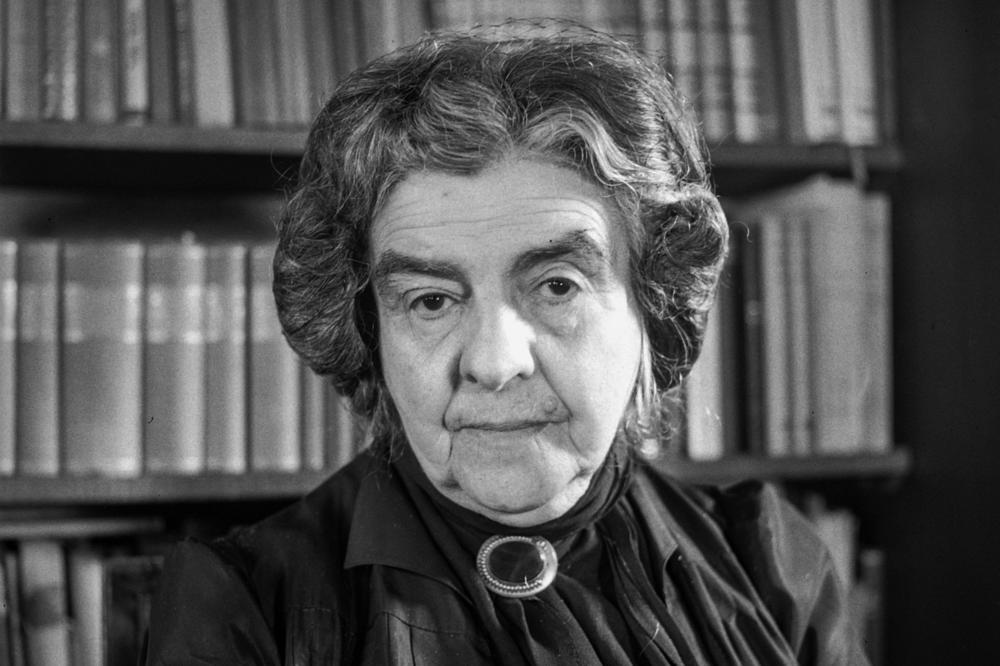“Bringing historical phenomena into sharp focus”
Sixty years ago Freie Universität bestowed an honorary doctoral degree upon philosopher and writer Margarete Susman.
Oct 23, 2019
Margarete Susman was granted an honorary doctorate from Freie Universität Berlin in June 1959. This photo was taken in 1947 in Zurich.
Image Credit: picture alliance/ullstein bild
Born in Hamburg in 1872, the philosopher and writer Margarete Susman left behind a massive collection of works, which German literary scholar Barbara Hahn digitized and made available online. In 1959, Susman was granted an honorary doctorate from Freie Universität Berlin. Michael Landmann, a Swiss philosopher and a professor at Freie Universität Berlin from 1951 to 1978, was responsible for promoting the effort within his department. The selection committee included Eduard Neumann, the dean of the philosophy department then, as well as Helmut Gollwitzer, Walter Killy, Ingeborg Schröbler, and Hans-Egon Hass.
In a letter from January 23, 1966, Michael Landmann told the university rector at the time about attending the memorial service of Margarete Susman, who had passed away on January 16. Her funeral took place in Zurich, where she had lived ever since emigrating from Germany. His letter also recounts that he brought a wreath to the memorial service as a token of Freie Universität Berlin’s esteem for Margarete Susman, which her family and friends appreciated. Landmann also enclosed a draft of an obituary, which he asked the rector to approve and then pass on to the editors of the university newsletter.
A copy of the obituary can be found in Margarete Susman’s honorary doctorate file in the university archive. The file documents an important chapter of Freie Universität Berlin’s history, one that is worth revisiting. The entire process of imparting an honorary doctorate to Susman is recorded in her file, and she remains the only woman to receive this particular honor from the department. The file also contains two other historically significant documents.
Margarete Susman’s thank-you letter from March 2, 1960, to the dean of the philosophy department. Due to a long period of illness, Susman’s reply was delayed more than half a year.
Image Credit: Freie Universität Berlin, University Archive, Department of Philosophy, Margarete Susman’s Honorary Doctoral Degree
One is Margarete Susman’s handwritten thank-you letter, and the other is the external evaluation by Martin Buber, which was co-signed by Ernst Simon, who like Buber was a professor at the Hebrew University of Jerusalem.
Susman’s letter from March 2, 1960, begins with an apology for her late reply. Due to a serious illness, she was not able to write immediately after receiving the doctoral recognition in the summer of 1959. She received the honor just a few months before her 87th birthday.
She expresses her gratefulness to Freie Universität in the following terms: “It was a great honor for me to receive this academic recognition so late in my life and to feel somehow welcome again in the country that was the first place I called home.”
Martin Buber and Ernst Simon’s evaluation. At the time both were professors at the Hebrew University of Jerusalem.
Image Credit: Freie Universität Berlin, University Archive, Department of Philosophy, Margarete Susman’s Honorary Doctoral Degree
Martin Buber and Ernst Simon praised Susman’s writings extensively in their evaluation, including her study of female figures in German Romanticism, as well as her philosophical works, which attest to her training as a student of Georg Simmel. Moreover, the evaluation recalls her expressionist writings, her five volumes of poetry, seven prose works, and her work as a journalist.
The praise for her writings also mentions Susman’s 1946 publication Das Buch Hiob und das Schicksal des jüdischen Volkes (“The Book of Job and the Fate of the Jewish People”). According to Buber and Simon, the book stands as a testament to Susman’s intellectual struggle with how to think about German-Jewish history after the Holocaust. Buber and Simon’s evaluation concludes with resounding support for Susman to receive the honorary doctoral degree.
The Department of Philosophy not only concurred with Martin Buber and Ernst Simon; moreover, the official text on the doctoral certificate from June 3, 1959, praised her as an intellectual in the highest terms possible. Michael Landmann echoed this sentiment in his obituary, stating that with the loss of Margarete Susman, “we are losing one of the last great representatives of German Jewish intellectual thought.”
Last, but not least, Landmann, who moved to Israel after retiring from Freie Universität, also deserves credit for his work promoting Margarete Susman’s nomination for an honorary doctorate just 14 years after the end of World War II.
The original German article appeared on September 16, 2019, in campus.leben online magazine of Freie Universität Berlin.



